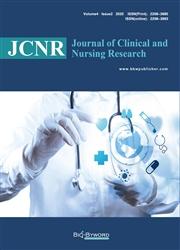Psychological Nursing Combined with Biofeedback to Promote the Rehabilitation of Patients with Anxiety Disorder
引用次数: 0
Abstract
Objective: To explore the effect of psychological nursing combined with biofeedback on the rehabilitation of patients with anxiety disorder. Methods: 100 patients with anxiety disorders in our hospital from January to December 2021 were randomly divided into two groups: control group (n = 50) and study group (n = 50). The control group was given routine nursing, while the study group was given psychological nursing combined with biofeedback. The changes of self-rating anxiety scale (SAS) score, self-rating depression scale (SDS) score, symptom score, and quality of life of the two groups were compared before and after nursing. Results: Before nursing, there was no significant difference in the scores of SAS and SDS between the two groups, but after nursing, the scores of SAS and SDS in the study group were lower than those in the control group, and the degree of improvement in the study group was higher than that of the control group. Before nursing, there was no significant difference in the scores of symptoms between the two groups (P > 0.05), but after nursing, the scores of stress, crying spells, tremor, and general discomfort in the study group were lower than those of the control group (P < 0.05). Besides, before nursing, there was no significant difference in the quality of life between the two groups (P > 0.05), but after nursing, the scores of physical function, psychological activity, social ability, and material life in the study group were higher than those in the control group (P < 0.05). Moreover, the degree of improvement after nursing in the study group was better than that of the control group. Conclusion: Psychological nursing combined with biofeedback to promote the rehabilitation of patients with anxiety disorder effectively improves the negative emotion of patients, reduces stress, depression, tremor, and general discomfort, and improve the overall quality of life. Therefore, it is worth further popularization.心理护理结合生物反馈促进焦虑症患者康复
目的:探讨心理护理结合生物反馈对焦虑症患者康复的影响。方法:将我院2021年1-12月收治的100例焦虑症患者随机分为对照组(n=50)和研究组(n=5 0)。对照组给予常规护理,研究组给予心理护理结合生物反馈。比较两组患者在护理前后焦虑自评量表(SAS)、抑郁自评量量表(SDS)、症状评分和生活质量的变化。结果:护理前,两组SAS和SDS评分无显著差异,但护理后,研究组的SAS和SDS得分低于对照组,且研究组的改善程度高于对照组。护理前,两组症状评分无显著差异(P>0.05),但护理后,研究组的压力、哭闹、震颤和全身不适评分均低于对照组(P<0.05),但护理后,研究组的身体机能、心理活动、社交能力和物质生活得分均高于对照组(P<0.05),且护理后的改善程度优于对照组。结论:心理护理结合生物反馈促进焦虑症患者的康复,有效地改善了患者的负面情绪,减轻了压力、抑郁、震颤和全身不适,提高了患者的整体生活质量。因此,值得进一步推广。
本文章由计算机程序翻译,如有差异,请以英文原文为准。
求助全文
约1分钟内获得全文
求助全文

 求助内容:
求助内容: 应助结果提醒方式:
应助结果提醒方式:


